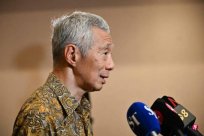The author hopes to point out that before the Westpulia system determined in 1648, before the international relations based on equality, sovereignty, and clear territorial and borders, the longer human historyThere is no such system.There have been countless wars between European nations, and overseas has opened up and has maintained a large number of colonies.This system and principles, although a major breakthrough in European history, and eventually changed the mode of getting along among different countries, it has not been able to prevent the colonial history of imperialism to weak countries in the following years.Essence
TheThe tribute system is the core model of ancient Chinese international relations. The theoretical origin of the implementation must be traced back to the "world" view and section system in the Western Zhou Dynasty."The World" is the world's awareness of the world before entering the modern world system and an international law system established by equal sovereign countries.From the perspective of the rulers of the Zhou Dynasty, "the world" is the core of the King, culture, and authority of the Zhou Dynasty, and the basic architecture of dozens of vassal states that have been separated.world.However, the world was in the scope of the territory of the Chinese rule at that time and the imagination of the peripheral space outside the territory.From today's perspective, it only covers the Central Plains in northern China.However, the triple structure of geography and politics here: Wang Yu, Hou Guo, and Siyi basically represent the ancient Chinese from introverted, from near to low, from high to low, from familiar to strange, pushing layer by layer., Grade order worldview.Because the princes and the monarchs worshiped Zhou Tianzi, they tried to Zhou Wang (Tianzi), and the obligation to assist in combat operations, the prototype of the "tribute" and supporting the psychological mechanism of its existence had appeared more than 3,000 years ago.
Because there is always a stable core of civilization with the Central Plains as the geographical center and cultural highland, the ancient Chinese civilization and political territory continued to expand outward and contracted inward.Fei Zhengqing, a Sinologist in the United States, has clearly pointed out that the border of ancient China was uncertain and unstable.Ancient China had a protracted war with northern grassland nomadic peoples in the northern grassland. Even in the process, we could see that the war was not the only model for the interaction between the Central Plains and the interaction of the grassland nomads.
First of all, during the Warring States Period, the Great Wall, built by the northern border vassal states, and connected by Qin Shihuang, is essentially a defensive work equivalent to barriers.Second, the peace policy implemented by the early years of the Han Dynasty also reflected the efforts of peaceful efforts between the Central Plains dynasty as much as possible.Third, from Emperor Hanwu, the Han Empire with a broad territory and strong military strength began to accept tribute from the northwest and northern countries.
The Western Han Dynasty can establish a tribute system. First of all, the Han Empire as the world empire, with a vast territory, a huge population, strong military power, developed academic culture, noble international reputation, stable domestic political economy, and improvedsystem.From the Qin Dynasty to the Ming Dynasty, the direct managed population managed by the Central Plains dynasty has been stable between 20 million and 60 million, which is unmatched by any country in the surrounding area.The synthesis of these traits has made the Han Empire indeed far more than neighboring small countries in various development areas.These small nations seek to trigger a tribute, establish peace with the Han Empire, enjoy the convenience of transportation and personnel, and do not have to worry about being directly controlled and exploited by the Han Dynasty.Balance also meets their respective safety needs and economic benefits.It should be said that this is a natural way to get along with a natural, gentle, and friendly way between a naturally formed large country and small country.
In addition, even if Emperor Hanwu responded, he defeated several large -scale battles to defeat the Xiongnu Grassland Alliance that had long been invaded in northern China for a long time.Damaged self -reflection and external criticism.In Japan, the master of Chinese studies in Japan, in discussion of Chinese history, pointed out that the Western Han regime was higher than the prince of his own.
China's inland farming civilization is the economic foundation, with Confucianism as the core, and the traditional cultural spirit of Taoism and Buddhist thoughts.Treating a small country with a tribute to establish peace diplomatic relations does not seek economic plunder and imperialist territorial expansion of modern colonial rule.In addition, the items carried by the tribute to the tributary are closer to the common "gifts" in Oriental culture, and the nature of "gifts" is exchanged.In other words, as the party of the Han Dynasty, as a party who received tributes, it usually returned a gift in the name of reward, making this communication a mutually beneficial relationship in line with the ceremony system.
Multiple considerations in the Ming Dynasty tribute system
In the Ming Dynasty, the tribute system was the most typical. It has multiple considerations to establish the legitimacy of the Chinese dynasty regime, consolidate the international reputation of the Ming Empire, and ensure security.In the eyes of the Emperor of the Ming Dynasty, the non -Chinese regime, outside the territory of the direct jurisdiction, can highlight the highest status and absolute authority of "the Lord of the World".In 1403, after the Ming Chengzu Zhu Xi obtained the throne and consolidated power through a rebellion, he sent the envoys to North Korea and Siam in Chaogongguo, and confessed his throne and legal status.In the Ming Dynasty, the concept of "the world" continued to be used, but the scope has expanded from northern China in the Zhou Dynasty to a larger space, including the territory of the Ming Dynasty, the surrounding ethnic minorities, and the kingdoms of other sizes.After all, Zheng He's fleet has been sailing to Africa, and the Chinese already know that "the world" is very broad.
In this map of geography and international relations, the Ming Dynasty China must be recognized by the surrounding small countries as the center of civilization, regarding the emperor of the Ming Dynasty as the emperor in their nominal, and the Ming court was registered in the form of the kings of the kings, and the Ming Dynasty’s of the Ming Dynasty.Only the rule achieved the effect of "Siyi Bin suit" in symbolic sense, and achieved the highest legitimacy.The culture of Confucianism as the core of the Ming Dynasty also really showed great appeal.The cultural attraction including the Confucian value system, the imperial examination system, and the beauty of Chinese trials is actually very close to the soft power people today, or the soft power of the predecessor of the modern world.
The two emperors of Zhu Yuanzhang and Zhu Xi in the early Ming Dynasty were very confident in the culture of Chinese culture. They believed that Chinese culture perfectly inherited the ancient saint's way, and it was in line with the will of the world, and it was worthy of admiration.On the side of realistic politics, the emperor of the Ming Dynasty also hoped to fight for peace as much as possible for China as much as possible.
Due to the multiple considerations based on the legitimacy of the regime, cultural confidence, and national security, the tribute system of the Ming Empire is also completely different from modern colonialism and imperialism for the purpose of capturing resources and expansion.The loose international alliance centered on China.This alliance is maintained with a non -enriched ritual relationship.The tribute country can stop the tribute and terminate the relationship, and the internal affairs are not interfered by the Ming Dynasty.
The exchange of tribute products mentioned above and the generosity that the Ming government deliberately shows, that is, the so -called "thick and thin" principle.In terms of quantity and value, they exceed the tributes they have received.According to statistics from some scholars, in the later period of Zhu Xi, that is, in the end of Yongle, the Ming Dynasty had 60 tribute countries, and returning gifts even became a heavy burden on the state's finance; but on the other hand, obtaining these property and becoming some small countries came to the tribute to tributeThe motivation.
Obviously different from European colonialism
In Europe in the same period, the successive rising marine hegemony national Portugal, Spain, and the Netherlands. Because the country's volume and economic strength are far less than the Ming Empire, it is expanded to plunder and compete for economic resources, actively establish the stronghold, operates operations, operates, and operates.Trade is the fundamental purpose, and it is essentially "economic imperialism". It is completely different from the Ming Dynasty's focus on political prestige, cultural etiquette, and border security.
First, as far as the acquisition method is concerned, the colonies are based on force occupation;The Dingchao Gong Kingdom is a country that is not requisited.Second, as far as the method of ruling is concerned, the tribute system only requires the tribute to the country to recognize the supreme status of the Chinese emperor, adopt the year number of the Chinese emperor, and accept the seal given by the Chinese dynasty. Based on its own situation, the countries of the Chinese dynasty are to the Chinese rulers according to their own conditions.Turnive tribute and maintain bilateral trade based on tribute.The approach of European colonial countries is to send direct rule to the colonial governor, plunder colonial resources naked, or make the colonial economy develop unscrupulous according to the demands of the princes of the clan, forming an economic attachment relationship to the prince country.Commercial activities of monopoly colonies.
Third, as far as the suspension of the relationship between the two parties is concerned, the number of Chinese tribute countries in China reached its peak during the period of Zhu Xi, because the later emperors such as Renzong, Xuanzong, and Yingzong reducing gifts to reward gifts, or they no longer encourage tribute, or maybe tribute, or maybe, or or not to encourage the tribute, or orSome tributes felt that the journey was too far away, the journey was too hard and gradually abandoned, and the number of Chaogong Guo gradually decreased.However, this process is not accompanied by strong resistance, and even some tributes have become an equal relationship with the Chinese dynasty after leaving the tribute relationship.The Philippines and the relationship between the tribute, register, and vassal established by the government in the early Ming Dynasty in the early Ming Dynasty were different from the colonial government established in Spain and the United States in the Philippines that caused a strong nationalist rebound in the Philippines.In 1882, France signed the French Hue Treaty through aggression and forcibly signed the French Yue Hue Treaty, and forcibly terminated the relationship between the Treaty of China and Vietnam, which was not constrained by the treaty, and was also a process of colonialism to replace the tribute system.European colonies such as Latin American countries, including the United States colonized by British, must be independent through unremitting armed struggle to obtain independence.
The relationship between Chaogong is of course not perfect.The prerequisite for trade and travel in the Ming and Qing dynasties as a tribute to trade and travel stipulates that non -North Korean citizens shall not engage in trade activities with China, and citizens cannot access China.If you want to establish a trade relationship, you must first accept the Confucian etiquette as the core and recognize the tribute system of the absolute political and moral authority of the Chinese emperor.The tribute trade of the Ming Dynasty was supervised by the government's city shipping department.All kinds of strict restrictions are indeed equal exchanges between sovereign countries pursued by the modern world and the principles of free trade.
Europeans clearly reject the Chinese -style tribute system
What the British wants to really solve through the Opium War is a series of deep issues involving Chinese and Western relations in addition to the smuggling drugs of opium: free trade, diplomatic equality, and the exemption of the British by Chinese criminal law.The intellectuals of the late Qing Dynasty spent a long time before realizing that modern Europeans are no longer a vassal state that looks up at Chinese culture and willing to surrender to the supreme authority of the Chinese emperor in the past.The unique political system, sovereign concept, legal system, and even different civilizations of the modern industrial system and weapon systems, pursue the diplomatic model of signing the contract between equal sovereignty countries, and the permanent diplomatic mission, and clearly reject the Chinese -style tribute systemEssence
For the late Qing Dynasty in the late Qing Dynasty, although the old -fashioned tribute relations had historically maintained the role of peace and security in the region, maintaining trade and diplomatic exchanges, it was too strict with the Chinese etiquette as the centered system.The negligence of the borders of the two countries clearly ignores the industry, and excessive restrictions are indeed not suitable for the independence, equality, openness, and free trade principles required by modern society, and it is not conducive to the Chinese people who know foreign culture more deeply.In addition, the tribute system is in the final analysis. It is a relationship between the government, and has no attention to the protection of civil exchanges and the protection of the rights of the diaspora.
However, the tribute system in China, as the cultural and psychological foundation of the tribute system from near, far, from the center to the edge, and continuously expands the diameter of the "world" view, and the Chinese emperor as the image of "the world of the world".After all, it is the unique geographical conditions, historical processes of China, and the national strength and volume far exceeding the national strength of neighboring countries. The result of interactive accumulation within thousands of years is also subject to the tolerance concept of the Confucian culture "Huai Rouyuan", which is unequal but unequal, butThe profound impact of reciprocal etiquette culture needs to be understood in the historical context.Compared with the harsh rule and plunder of modern colonialism, and the military conquest of imperialism, although the tribute system seems to be outdated, it is relatively rational and mild.There are high -level civilizations and strong military power and many small countries on the edge of their political order to get along peacefully.
In fact, the history of the modern diplomatic system led by China itself is that the imperialism has launched several wars against China, and the "inequality treaty" of more than 1,000 writings coerces China to force China to change the humiliation and humiliation.Pain history.The international political characteristics of the 19th century were the rise of the "national imperialism" referred to by the famous Chinese thinkers Liang Qichao and its world hegemony.The famous Chinese historian Tang Digang once pointed out: "The Qing government (the Qing government (1858 and 1860) signed the treaties in Tianjin and Beijing, which can be saidIn the city of the city, the strong is deliberately requested, and the weak person leaned down to listen to it -Sri Lanka is the actual passing of some historians in the West today to promote China to join the 'World Society' and join the "Treaty System '"
being strongly included in the modern international system
Obviously, Tang Degang did not agree with this process simply as the modernization process of positive positive integration of China into the world, because the "world" here is just a strong man, that is, the world dominated by imperialism, and China's joining process isThere is no process of equality and coercion as the weak.Tang Degang further pointed out that Britain joined a "most vicious" clause through the 1860 Beijing treaty, that is, the legalization of the opium trade, and eventually seized all economic privileges in China, turning China into India with sovereignty in a form of sovereignty.This returns to the aforementioned, Portugal, Spain, and the Netherlands, such as the old imperialist country earlier in Britain, are the "economic imperialism" issues that are profitable.Chen Xulu, a well -known modern historian in China, also pointed out that "foreigners deprived of squeezing squeezing through the treaty 'legally', controlling China, and driving Chinese society out of tracks and diverting deformation."
The author hopes to point out that before the Westpulia system determined in 1648, before the international relations of international relations based on equality, sovereignty, and a clear territory and border, there was no such thing as a more long human history.System.There have been countless wars between European nations, and they have pioneered overseas and have been maintaining a large number of colonies. The Westparia system itself is also the result of the "Thirty -Year War" in Europe.Although this system and principles, although a major breakthrough in European history and eventually changed the mode of getting along with different countries, it did not prevent the history of imperialism on weak countries in the following hundred years.
The well -known reformer and entrepreneur Zheng Guan should be signed after the signing of the Sino -Japanese Malaysia Treaty in 1895. In front of imperialist aggression, extortion compensation, and forced to cut the ground, he once enthusiastically introduced international law to Chinese readers ("" ""The principle of the Public Law of the Kingdom seems to be completely lost.In the previous 1884, Zheng Guan should visit Vietnam, Singapore and Bangkok as the manager of the Wan Ship Investment Bureau, hoping to use the past tribute relations to make China get Siam's aid in the War of Resistance in France.It can also be seen that the complex relationship between China's tribute relations and modern diplomacy and war.
The author is an associate professor at the Department of History of the Academy of Academy in the United States




